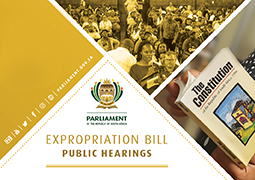
Commercial farmers’ associations expressed concern about amendments to the Expropriations Bill at Lekkerbreek Primary School in Modimolle Local Municipality, in Limpopo, on Saturday. The hearing was the third in the Portfolio Committee on Public Works and Infrastructure’s public hearings on Expropriations Amendment Bill in the province.
The main objective of the Bill is to provide for the expropriation of property for a public purpose or in the public interest and provide for certain instances where expropriation with nil compensation may be appropriate in the public interest.
Also participating in the hearings were representatives of the Agri Limpopo, a federation of farmers’ associations located across the province and the Waterberg Sakekamer Business Chamber. Both organisations criticised the current form of the Bill.
Ms Deidre Carter, the Chief Executive Officer (CEO) of Agri Limpopo, informed the committee that the federation comprises 410 commercial farming operations in the Limpopo Province, providing 90 000 jobs for the province. She further said that commercial agriculture in Limpopo plays a strategic role as the second largest contribution to food security in the country, providing local, provincial and national economic growth, development and export earnings.
Although the federation recognises the committee’s work to replace the current Expropriation Bill, the federation’s viewpoint is that it cannot support the inclusion of the possibility of nil compensation. Therefore, Agri Limpopo does not support the inclusion of clauses 12(3) and 12(4) in the latest version of the Bill, which provide for nil compensation.
In addition, the federation is against the current definition of “public interest” in the Bill. Agri Limpopo believes the definition is too broad and gives too much discretion to government officials to decide what is in the public interest. They asked Parliament to not attempt to define the term in Section 25 of the Constitution, except by restating what is already contained in the Constitution. Agri Limpopo believes that it is for the courts, not Parliament to interpret the term as used in the Constitution. Also, Agri Limpopo does not support the definition of “public purpose” in the Bill, as they perceive it as incomplete with the need for clear regulation of the public purpose requirement in legislation to ensure conformity with Section 25(2) of the Constitution.
In their presentation, the Waterberg Business Chamber argues that the primary motive behind the concept of expropriation without compensation relates to the unfair distribution of landownership in South Africa. However, they maintain that in many countries when social challenges are identified, practical solutions are first considered and policy frameworks are then formulated to introduce solutions to address such challenges.
Thereafter, the legislation is enacted to give effect to the proposed solutions. According to the Chamber, the South African government has been unable to provide realistic and practical solutions within the framework of existing legislation and continues to introduce more amendments, creating unrealistic expectations without practical solutions of any substance. The Waterberg Business Chamber does not support the current form of the Expropriation Bill, the committee heard.
In her closing remarks, Ms Nolitha Ntobongwana, the committee Chairperson said, “We have received and recorded all your views… those that support the Bill and those who do not, and including those who suggest that we must first amend Section 25 of the Constitution. Upon completion of the committee’s public hearings programme in all the provinces to end in June [2021], we will report back to Parliament regarding all your concerns and considered views.”
Manelisi Ntsodo
10 April 2021

